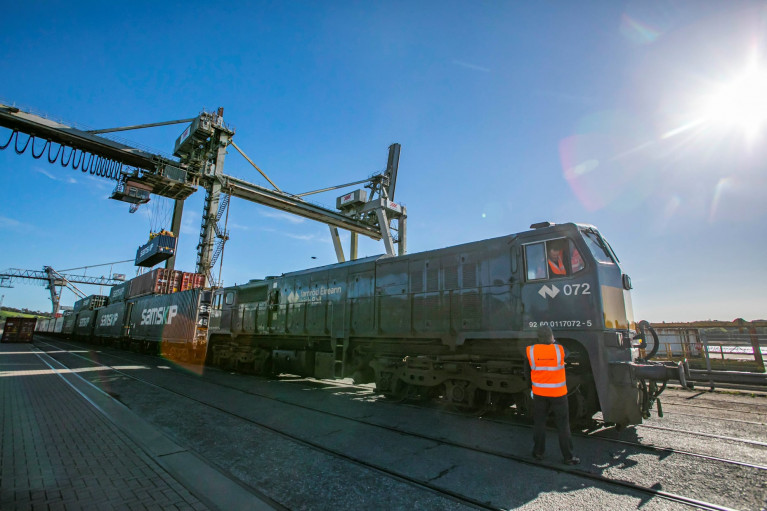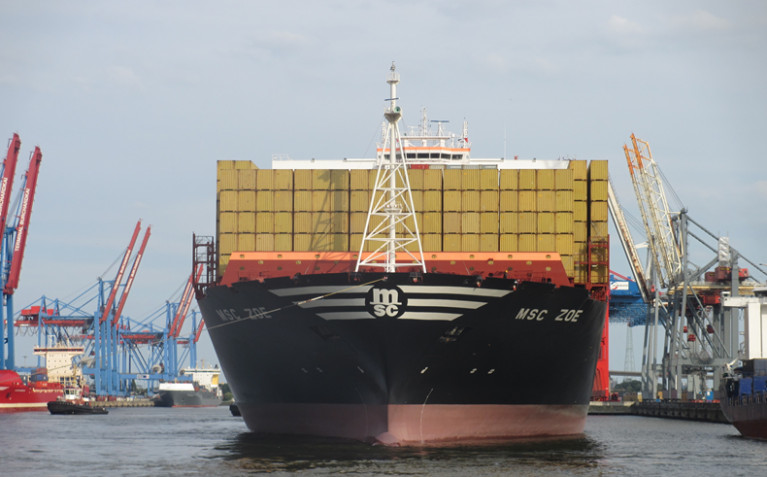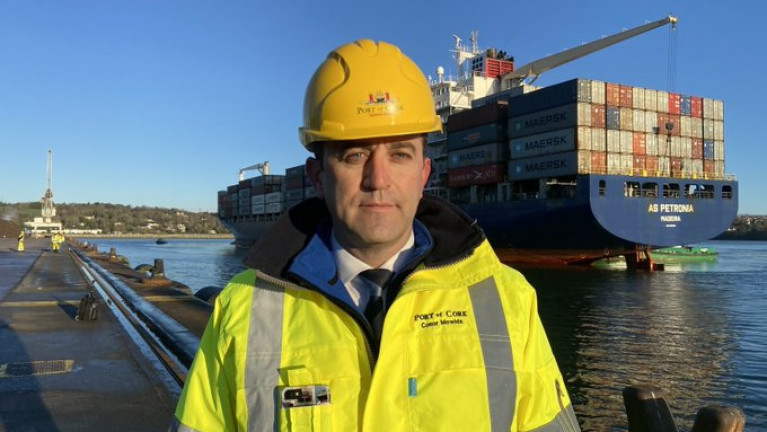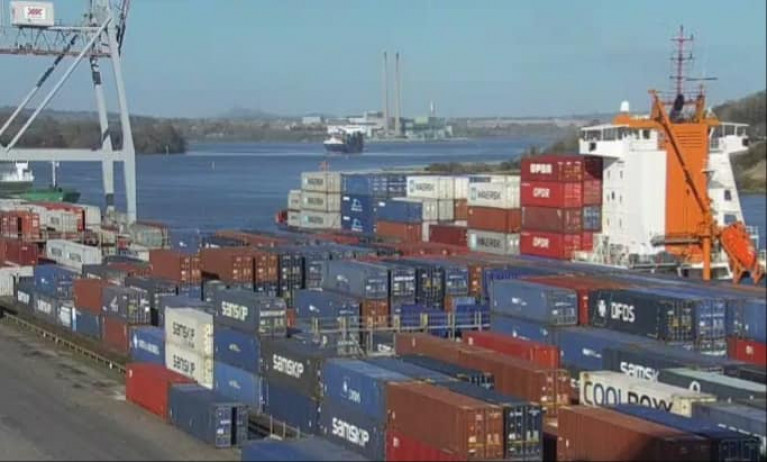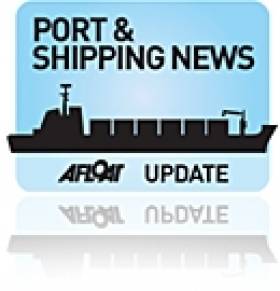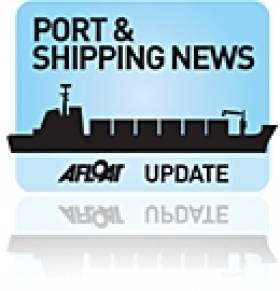Displaying items by tag: containers
Irish Rail Launch National Freight Plan With Ports Among 2040 Strategy
Irish Rail (Iarnród Éireann) has launched a national rail freight plan in Ballina in Co Mayo, which aims to increase operations in line with growth in demand across the EU.
As RTE News reports, the company says the expansion will be in line with the Government's Climate Action Plan goals.
Ballina is one of Iarnród Éireann’s key hubs for the movement of freight, with container services operating to Dublin Port and, in recent months, to the southeast of the country.
This morning, the rail yard was busy organising the transportation of Coillte pulpwood to Waterford Port (see Samskip container business)
The Rail Freight 2040 Strategy aims to have a five-fold increase in operations, including over 100 new weekly services across the network with new low carbon modes of transport.
To read more including from Glenn Carr, General Manager of Rail Freight Ireland (and Rosslare Europort Afloat adds) click here.
Operator MSC Closes in On Maersk With Containership Capacity
Containership giant, Mediterranean Shipping Co is on track to overtake 2M alliance partner Maersk as the world’s largest container line by capacity deployed if it continues with its aggressive acquisition policy.
MSC operates a fleet of 587 boxships comprising 3.9m teu, while Maersk’s 711 ships have an aggregate capacity of 4.1m teu, figures from Alphaliner show. The capacity gap between the two stands at just 234,000 teu.
“Irrespective of past developments and fleet growth, the carriers’ opposing stance on container vessel newbuilding is expected to see MSC overtake its Danish competitor and claim the global top spot some time in 2022,” Alphaliner said.
MSC’s orderbook stands at nearly 660,000 teu, mainly consisting of ultra-large tonnage, compared with Maersk, which has only 42,000 teu of smaller tonnage on order.
More from LloydsLoadingList.
Port of Cork Sees Increase in Container Traffic Ready for Brexit Bounce
At the Port of Cork there has seen a 10% increase in container traffic in the past six weeks.
With a new €86m container terminal due to be commissioned in Ringaskiddy later this year, the port company said it is preparing for a Brexit bounce, with direct services to the continent already expanding.
Cork is a Tier 1 port of national significance, along with Dublin Port and Shannon Foynes.
It is responsible for between 15% and 20% of the overall tonnage that passes through Irish ports and handles an average of 10m tonnes of cargo every year.
Brexit had presented as a threat, but thanks to direct services to the continent, such as the twice-weekly CLdN service between Cork and Zeebrugge, container volumes are up 10% over the past six weeks on this time last year.
CLdN introduced its direct Cork-Zeebrugge service last May The company said "booming demand" has led to the introduction of a second weekly call on the service.
More from RTE News here.
Supporting International Trade As the Port of Waterford Forges Ahead through Covid-19 Crisis
At the Port of Waterford work is continuing to operate through the Covid-19 global pandemic as an essential link for businesses trading globally from the southeast region and beyond.
Export and import traffic continues through the Port and there was a 23% increase in container traffic and a 15% decrease in bulk throughput in the three months to March 31 this year compared to the same period in 2019.
Overall, the first quarter of the year saw 113 ship movements at Waterford compared to 112 in the same three months in 2019.
Frank Ronan, Chief Executive, Port of Waterford, said: “Protecting public health is clearly the top priority for everyone at present and that’s as it should be. Some of the food and pharmaceutical shipments that we facilitate very much align with that effort.
For more here reports WaterfordLive
Hazardous Cargo Containers Drifing Towards Ireland
PORT & SHIPPING NEWS - A number of hazardous containers believed to have fallen from a cargo ship this summer are drifting towards Ireland's southwest coast, the Irish Examiner reports.
The containers are said to have slipped from the deck of the MSC Flaminia, a German-registered cargo vessel which caught fire on 14 July in the middle of the Atlantic Ocean, with the loss of two crew and forcing the rest to abandon ship.
The vessel had been en route from North Carolina in the United States to Brememhaven in northern Germany when the incident occurred.
Among the thousands of containers it was carrying were 149 classed as 'dangerous goods', their exact nature not yet confirmed, and it is thought some of these are among the containers that fell into the sea and went missing as the ship listed in mid-ocean.
As reported by the Maritime Bulletin, there was some speculation as to whether the missing containers slipped off deck or were jettisoned.
The containers have since appeared in the main cargo shipping lanes off the southwest coast, posing a danger to transatlantic vessels.
Operations have already begun to retrieve the containers and tow them into Castletownbere in West Cork.
The Irish Examiner has more on the story HERE.
New Zealand Cargo Ship Wreck Breaks Up in Heavy Seas
#SHIPPING - The Greek-owned cargo ship which ran aground off New Zealand three months ago - described as the country's worst maritime disaster - has split in two in heavy seas.
In a scene thankfully avoided closer to home, with the successful tranfer of 54,000 tonnes of vacuum gas oil from the damaged tanker Germar Companion in Belfast Lough, rough conditions off the New Zealand coast have caused the stern section of the Rena to snap off.
As many as 300 containers were washed overboard, polluting the water with milk powder and other debris, and fears are growing of a new oil spill in the coming days posing a threat to marine wildlife.
According to BBC News, hundreds of tonnes of fuel have spilled into the sea since the ship first ran aground at the Atrolabe Reef off North Island on 5 October, causing the deaths of hundreds of seabirds.
Though more than 1,100 tonnes of oil have been removed from the stricken vessel, some 385 tonnes remain aboard.
BBC News has more on the story HERE.




























